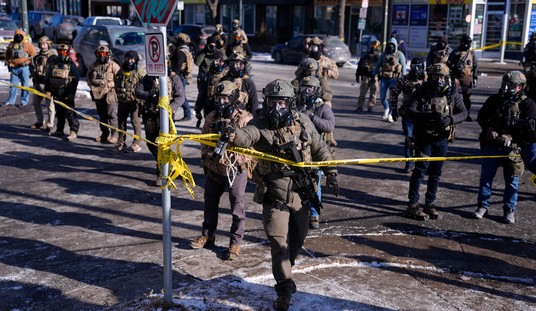The Cold Civil War has temporarily settled into a waiting game. The political combatants like two tired boxers, are punching without much energy, both sides cut and bloodied. All semblance of grace and beauty has gone out of the match. The struggle to control Washington is driven by sheer brutality now.
In one sense the institutions are already marred by collateral damage. The assault on the capital when it finally came did not take the genteel form of freshman candidates arriving with an idealistic agenda. Instead of Mr. Smith, Donald Trump came to Washington on the wings of chaos, a force that could take the media narrative and spit it back in a form even more toxic than its original form. As Roger Simon observed the establishment is beginning to realize that they can retake the town only at the price of wrecking it. Perhaps they already have. War is hell and political war no exception.
The most subconsciously symbolic expression of Washington’s crisis were leaked arrangements for Senator John McCain’s possible funeral. The senator has a deadly form of brain cancer and NBC says that in the event of his death he wants old Washington, not the new one, to bury him. Former presidents Barack Obama and George Bush were asked to deliver the eulogies. The current president need not apply.
In a way the McCain plans resemble nothing so much as a modern Viking funeral, with the former naval aviator and son of legendary admirals preparing for his last voyage on a ship of fire. In that ancient rite “the pyre was constructed to make the pillar of smoke as massive as possible, in order to elevate the deceased to the afterlife.” But where the Norse funeral was meant to memorialize the glory of a great warrior the mood in Washington appears more in anticipation of Ragnarok.
Lost in the gloom is the latent sense of renewal that all great disruptions — including this one — inherently contain. As Stephen Moore wrote in the Hill, outside of political circles things are unaccountably upbeat.
Two stories appeared on the front page and above the fold in the New York Times over the weekend. The first was about the seemingly never-ending Russia probe. The second was about the Labor Department reporting the lowest unemployment rate in nearly 20 years. Which of these two stories do you think American voters care more about?
Whatever’s responsible for it something outside of old Washington is working. Recently Warren Buffet explained why he was betting on a prosperous future.
With more than 360,000 workers in operations as vast as manufacturing, retail, insurance, financial services, railroads and energy, Berkshire subsidiaries produce the components, goods and services that help drive the engine of American commerce.
This gives Buffett a unique view on the health of the American economy, which he has said is growing more quickly than in the recent past. He recently told CNBC that business activity is “stronger than it’s been. It’s been improving year after year after the financial panic [of 2008].”
He has talked about the ways American ingenuity and resourcefulness have improved the lives of the middle class. Those improvements have given them options in education, medicine, travel and entertainment that weren’t accessible but by the very rich only a couple of generations ago.
If the recent political struggles contain a silver lining it’s the realization that Washington isn’t so important after all. The twilight of the capital gods is interesting but ultimately less than tragic when you can order another by mail. The mood of gloom almost calls forth a Gandalfian rebuke. “Authority is not given to you, Steward of Gondor, to order the hour of your death. And only the heathen kings, under the domination of the Dark Power, did thus, slaying themselves in pride and despair, murdering their kin to ease their own death.’” America may not only survive but prosper; 2016 was not just an end. It was also a beginning.
Follow Wretchard on Twitter
For a list of books most frequently purchased by readers, visit my homepage.
Support the Belmont Club by purchasing from Amazon through the links below.
Books:
The Second Machine Age: Work, Progress, and Prosperity in a Time of Brilliant Technologies, by Erik Brynjolfsson and Andrew McAfee. This book reveals the forces driving the reinvention of our lives and our economy. As the full impact of digital technologies is felt, we will realize immense bounty but also experience wrenching change. Professions of all kinds – from lawyers to truck drivers – will be forever upended. Companies will be forced to transform or die. Recent economic indicators reflect this shift: fewer people are working, and wages are falling even as productivity and profits soar. Drawing on years of research and up-to-the-minute trends, MIT’s Brynjolfsson and McAfee identify the best strategies for survival and a new path to prosperity.
Open Curtains: What if Privacy were Property not only a Right, by George Spix and Richard Fernandez. This book is a proposal for bringing privacy to the internet by assigning monetary value to data. The image of “open curtains” is meant to suggest a system that allows different degrees of privacy, controlled by the owner. The “curtains” may be open, shut, or open to various degrees depending on which piece of data is being dealt with. Ultimately, what is at stake is governance. We are en route to control of society by and for the few rather than by and for the many, because currently the handful of mega tech companies are siphoning up everyone’s data, for nothing, and selling it. Under the open curtains proposal, government would also pay for its surveillance in the form of tax rebates, providing at least some incentive for government to minimize its intrusions … (from a review by E. Greenwood).
Skin in the Game, by Nassim Nicholas Taleb. In his new work, Taleb uses the phrase “skin in the game” to introduce a complex worldview that applies to literally all aspects of our lives. “Never trust anyone who doesn’t have skin in the game. Without it, fools and crooks will profit and their mistakes will never come back to haunt them,” he says. In his inimitable style, he pulls on everything from Antaeus the Giant to Hammurabi to Donald Trump to Seneca to the ethics of disagreement to create a jaw-dropping tapestry for understanding our world in a brand new way.
For a list of books most frequently purchased by readers, visit my homepage.
Did you know that you can purchase some of these books and pamphlets by Richard Fernandez and share them with your friends? They will receive a link in their email and it will automatically give them access to a Kindle reader on their smartphone, computer or even as a web-readable document.
The War of the Words, Understanding the crisis of the early 21st century in terms of information corruption in the financial, security and political spheres
Rebranding Christianity, or why the truth shall make you free
The Three Conjectures, reflections on terrorism and the nuclear age
Storming the Castle, why government should get small
No Way In at Amazon Kindle. Fiction. A flight into peril, flashbacks to underground action.
Storm Over the South China Sea, how China is restarting history in the Pacific
Tip Jar or Subscribe or Unsubscribe to the Belmont Club










Join the conversation as a VIP Member